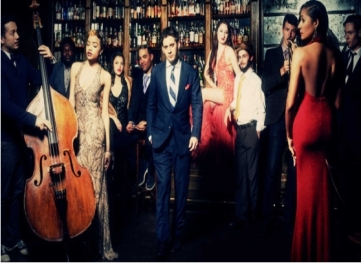
The work of Postmodern Jukebox has been viewed on the internet well over a hundred million times. Most of those doing the viewing, however, are not fully aware of the method to the band’s madness.
On the surface, the method is video – clips of full-band performances shot in the bandleader’s living room with a single stationary camera. The madness: pop hits of the present performed à la pop hits of the past. Miley Cyrus’ “We Can’t Stop” assayed as a doo-wop number; Macklemore and Ryan Lewis’ “Thrift Shop” tricked out in flapper jazz; Sam Smith’s “Stay With Me” rendered a 1940s big-band standard.
In fact, their method runs deeper. They’re educating their audiences about 20th-century song styles; commenting on the elasticity of the pop form; confounding cultural context; uniting generations; and breaking the rules. PMJ’s manifesting postmodernist ideas in his approach to production and business as well as music. But as far as the fans are concerned, it’s just fun (and sometimes funny).
Clearly, so does everyone else, as evidenced by PMJ’s presence on concert stages (stateside and abroad) and Billboard’s Jazz Albums chart, where its self-released 2014 opus “Historical Misappropriation” landed in the Top 10 alongside John Coltrane’s “Offering: Live at Temple University” and “All Rise: A Joyful Elegy for Fats Waller.”
Which isn’t to discount the importance to PMJ’s development of Michael Jackson’s “Bad,” the vinyl incarnation of which was, band leader Scott Bredlee says, “the first album I ever loved.” That was when he was six, growing up in Pattenburg, New Jersey, where he moved at four from Nesconset, New York. He took piano lessons, but they didn’t take. Then, at age 12, Bradlee heard “Rhapsody in Blue” and was forever changed. “I got the sheet music and taught myself how to play it,” he recalls. “I started wondering, ‘Where does this come from? What else sounds like this?’”
Asked what appealed to him about the popular music of the 1920s, ragtime especially, he says, “I could play it fast and loud. It was brash. And it had contempt for rules, which really appealed to me.”


Follow Us